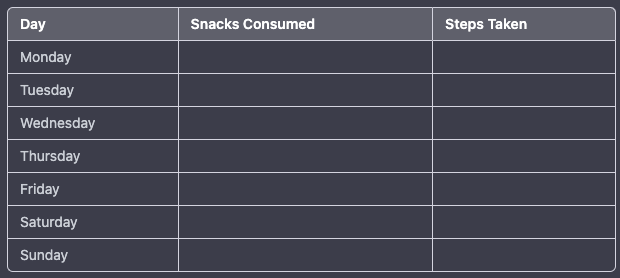🕵️♀️ Data Detective
By engaging in the Data Detective activity, children can gain hands-on experience in data collection and analysis, helping them understand the relevance of data in their daily lives and develop important analytical skills.
Objective
Teach children about data collection and analysis by tracking simple data points from their daily lives and discovering trends or patterns.
Age Group
6-12 years old
Materials Needed
Pen or pencil
Notebook or paper
Optional: Smartphone or pedometer for counting steps
Instructions
Introduction
Explain the purpose of the activity: to learn about data collection and analysis by tracking simple data points from daily life.
Discuss the importance of accurate data collection and how it can help us make informed decisions or identify patterns.
Choose a data point
Ask your child to choose a simple data point to track for a week. Examples include types of snacks consumed, steps taken, hours spent playing outside, or minutes spent reading.
Make sure the chosen data point is easy to measured and track daily.
Ask your child if they have any theories about what they’ll see in the data.
Set up a data collection chart
Create a simple chart or table on a piece of paper or in a notebook. Label the columns with days of the week and rows with the chosen data point.
Track the data daily
Each day, help your child record the relevant data in the chart. Encourage them to be consistent and accurate in their tracking.
If tracking steps, consider using a smartphone or pedometer to make the process more accurate and fun.
Analyze the data
At the end of the week, sit down with your child and analyze the collected data.
Discuss any trends or patterns that emerge, such as a preference for certain snacks, more steps taken on specific days, or variations in outdoor playtime.
Ask your child if they found anything surprising in the data.
Encourage your child to think about the reasons behind these patterns, such as time constraints, weather, or personal preferences.
Are there any charts or graphs you could use to better visualize the data?
Can you think about any calculations you could create using the data?
Reflect on the activity
Talk about what your child learned during the activity, including the importance of data collection and analysis in daily life.
Discuss ways to improve the data collection process or how to apply these skills in other aspects of life.
Encourage your child to consider other data points they might want to track in the future to learn more about themselves or their environment.
Did the results create any questions that perhaps could be answered with more data?
If the data was collected in different ways, say collected each morning for the previous day vs. collected at night for the current day, would you expect to say anything different in the data?
Now that we have collected and analyzed the data, is there anything you would have done differently?
Would having a larger sample size, say an entire month vs. one week, make any difference?
Download and Print
You can download and print the instructions for this activity using the link below:
Have questions? What to share feedback?
We'd love to hear from you, if you have any questions, want to offer feedback on this activity, or want share your experience, you can:
Email: jason@33sticks.com
Tag on Twitter: usujason
Tag on Instagram: usujason

